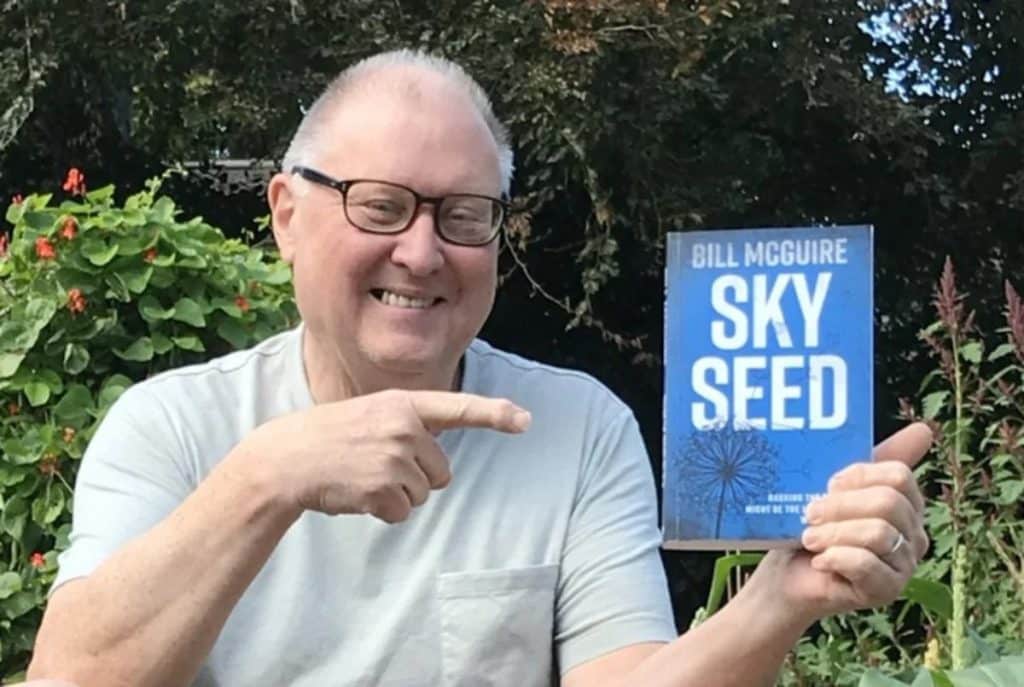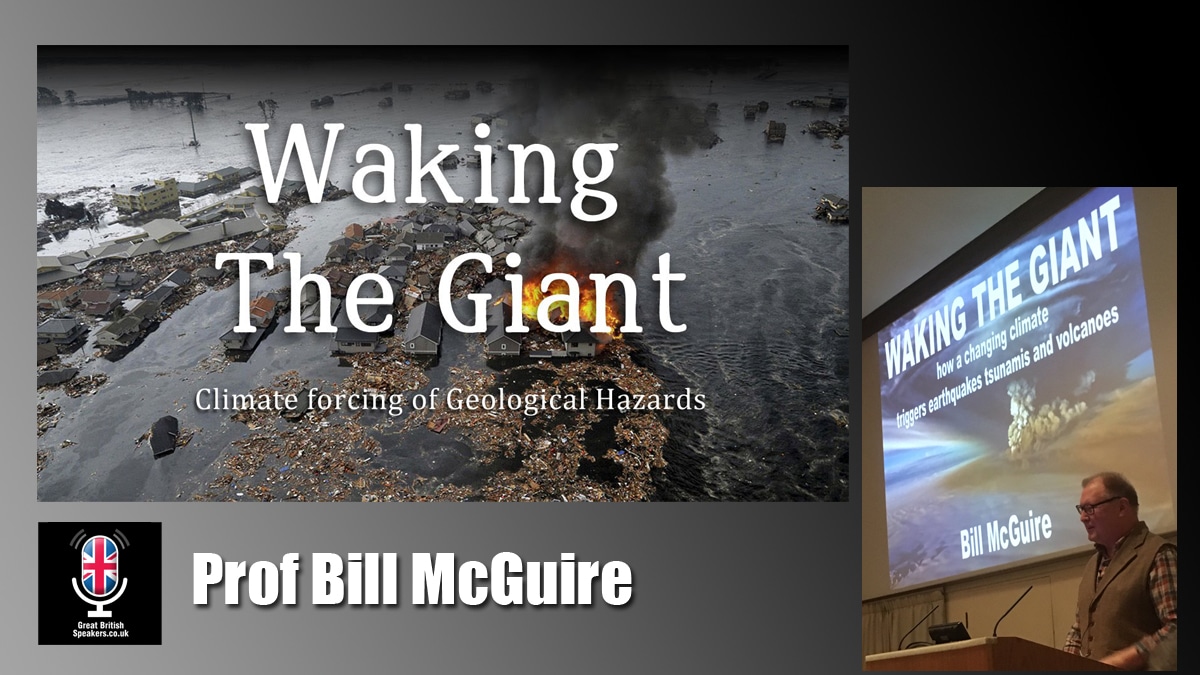Prof Bill McGuire
[favorite_button post_id=""]
Prof Bill McGuire
“Get into environmental activism as soon as possible. There really is only one Planet Earth.”
Professor Bill McGuire is a highly respected geophysical academic, specialising in volcanology, climate change and natural disasters. He has been the Professor Emeritus of Geophysical and Climate Hazards at University College London since 1997.
He is the Director of the Benfield UCL Hazard Research Centre and has authored and edited over 400 books, papers and articles on volcano instability and hazards, natural disasters and climate change.
As a reporter, Bill has appeared on multiple TV and radio channels for a variety of programmes including Disasters in Waiting (2000) and Scientists Under Pressure (2001) for BBC Radio 4 and also appeared on The End of the World Reports on Channel 5 and Sky News. He was the main contributor and consultant for the BBC Horizon films Supervolcanoes (2000) and Megatsunami – Wave of Destruction (2000).
His written works include A Guide to the End of the World: Everything You Never Wanted to Know (2002), Surviving Armageddon: Solutions for a Threatened Planet (2005) and Seven Years to Save the Planet (2008). His book Waking the Giant: How a Changing Climate Triggers Earthquakes, Tsunamis and Volcanoes (2012) peaked at number five in The Guardian’s Top 10 eco-books.
Contact Great British Speakers today to book climate change Professor Bill McGuire for your next event.
Type Of Talent
More About Prof Bill McGuire
Professor Bill McGuire is regarded as one of the top UK experts on geological disasters including supervolcanoes, impact events, tsunamis and earthquakes. Whilst he advises on all areas, his main research sites are the Canary Islands, Mount Etna and the Yellowstone National Park supervolcano in Wyoming.
Prof Bill McGuire Academic Work
Bill studied at UCL and Luton College of Higher Education and gained a PhD in Geology from University College London. He began lecturing in geology at the West London Institute of Higher Education in the 1980s, and was then appointed Reader at Cheltenham & Gloucester College of Higher Education. He was made Senior Scientist at the Montserrat Volcano Observatory in 1996, the Professor of Geohazards and Director of the Aon Benfield UCL Hazard Research Centre in the 1990s where he stayed until 2011.
Bill McGuire Government Climate Advisor
In the wake of the 2004 Indian Ocean Tsunami, Bill became part of the UK Government’s Natural Hazards Working Group and was made a member of the Scientific Advisory Group for Emergencies (SAGE) in 2010 after the Icelandic volcano Eyjafjallajökull erupted. He is a member of the Lancet-UCL Commission on the Health Effects of Climate Change, is an advisory board member of the Contraction & Convergence Foundation, co-director of the New Weather Institute and a member of the Science Advisory Panel of the Science Media Centre.
Bill McGuire Climate Disruption Campaigner
Bill McGuire is also one of five founding signatories – along with scientists Chris Rapley, Sarah Bracking, Simon Lewis and Jonathan Bamber – of the “Science Oath for the Climate”. This is a pledge to help prevent catastrophic climate disruption and to raise awareness of environmentalism and climate change.
Bill McGuire TV and Media Work
Bill McGuire is also a regular contributor to a number of magazines, newspapers and websites including The Guardian, BBC Focus, The Times, The Observer, Prospect and New Scientist. He was a contributing author on the 2011 IPCC Report on extreme climate events and changes. He contributes to blogs for Extinction Rebellion, The New Weather Institute, Scientists for Global Responsibility and Operation Noah, and is often seen lending his expertise to television programmes such as BBC’s Horizon, Countdown to Doomsday (2006) on the Sci-Fi Channel and Decoding the Past (2005-2008) for The History Channel.
Prof Bill McGuire Writing
His critically-acclaimed books include a range of fiction and non-fiction titles including:

FICTION
– Knock Three Times: 28 Modern Folk Tales for a World in Trouble (2019)
– Skyseed (2020)
NONFICTION
– Global Catastrophes: A Very Short Introduction (2014)
– Walking the Giant: How a Changing Climate Triggers Earthquakes, Tsunamis and Volcanoes (2012)
– Climate Forcing of Geological Hazards (2012)
– Global Catastrophes: A Very Short Introduction (2006)
– Surviving Armageddon: Solutions for a Threatened Planet (2005)
– Volcanoes of the World (1997)
– Raging Planet: Earthquakes, Volcanoes and the Tectonic Threat to Life on Earth (2002)
– A Guide to the End of the World: Everything you Never Wanted to Know (2002)
– Natural Hazards and Environmental Change (2002)
– Natural Disasters: Get Up Close to Earth-Shattering Natural Forces (2007)
– Apocalypse (2000)
Bill says:
An astonishing transformation over the last 20,000 years has seen our planet flip from a frigid wasteland into the temperate world upon which our civilisation has grown and thrived. This most dynamic episode in Earth history saw the crust bouncing and bending in response to the melting of the great ice sheets and the filling of the ocean basins; triggering earthquakes, spawning tsunamis and provoking a lively response from the world’s volcanoes.
Now there are signs that human-induced climate change is encouraging the sleeping giant beneath our feet to stir once again. Could it be that we are on track to bequeath to our children and their children not only a far hotter world, but also am ore geologically dangerous one?
The ground beneath our feet may seem safe and solid, but earthquakes, volcanic blasts and other hazardous natural phenomena leave us in no doubt that this isn’t the case.
The Earth is a dynamic planet of shifting tectonic plates that is responsive to change, particularly when there is a dramatic climate transition. We know that at the end of the last Ice Age, as the great glaciers disappeared, the release in pressure allowed the crust beneath to bounce back. At the same time, staggering volumes of melted water poured into the ocean basins, warping and bending the crust around their margins. The resulting tossing and turning provoked a huge resurgence in volcanic activity, seismic shocks, and monstrous landslides – the last two above the waves and below.
The frightening truth is that temperature rises expected this century are in line with those at the end of the Ice Age. All the signs are that unmitigated climate change due to human activities could bring about a comparable response.
Using evidence accumulated from studies of the recent history of our planet, and gleaned from current observations and modelling, we ignore at our peril the threats presented by climate change and the waking giant beneath our feet.
Call +44 1753 439 289 or email Great British Speakers now to book geological Professor Bill McGuire for your corporate event.
Contact us.
Get In Touch









